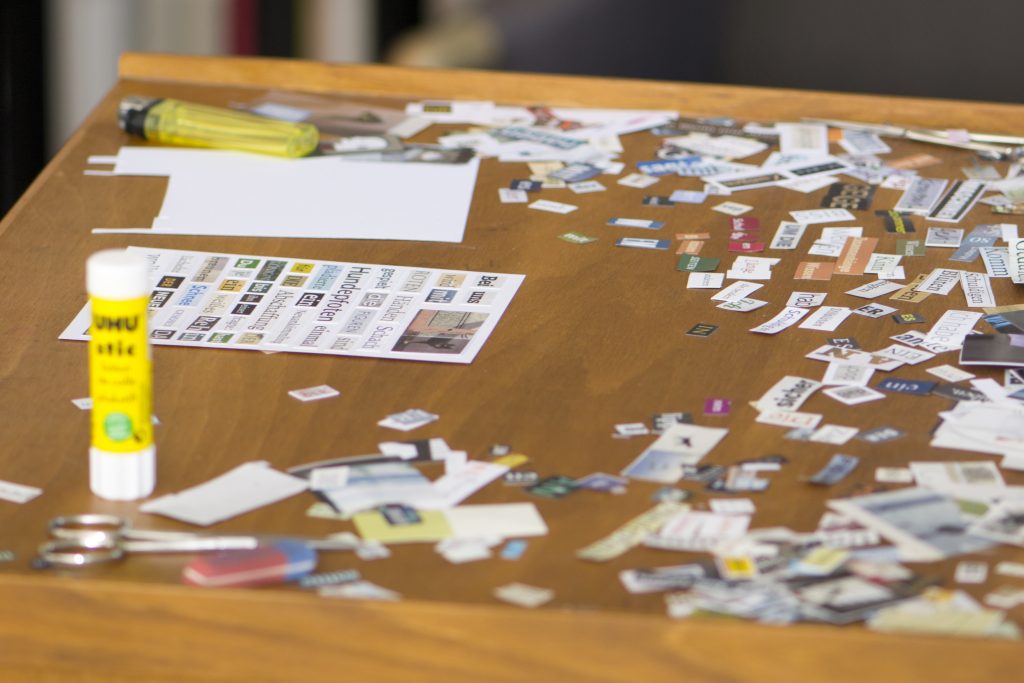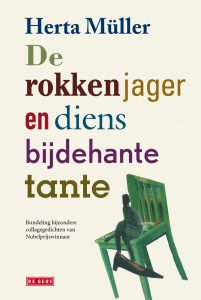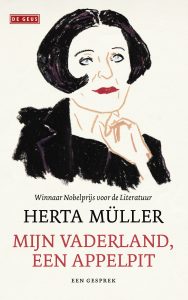Deze week verscheen de autobiografie van Nobelprijswinnares Herta Müller, Mijn vaderland, een appelpit. Enkele jaren geleden had A Quattro Mani een exclusief interview met de Roemeense schrijfster, toen haar eerste bundel van poëziecollages verscheen, De rokkenjager en diens bijdehante tante. We spraken haar bij haar thuis in Berlijn, ze liet zien hoe haar poëziecollages tot stand komen, en het maken van een foto bracht haar – maar ook ons – het kippenvel op de armen. Het was een van de indringendste ontmoetingen met een schrijver die we ooit meemaakten. Ter gelegenheid van het verschijnen van de autobiografie van een van de grootste schrijvers van Europa, een herpublicatie van dit interview.
Kwelling
Het winnen van de Nobelprijs voor de Literatuur in 2009 moet voor Herta Müller tegelijk een zegen en een kwelling zijn geweest. De vele reizen en lezingen, de aandacht voor haar persoon en de talloze interviews en fotosessies die volgden, hebben haar uitgeput. Steeds opnieuw worden de eindeloze verhoren in herinnering geroepen waaraan ze jarenlang door de geheime dienst is onderworpen tijdens de dictatuur van Ceausescu. De spanning – angst zelfs – is van haar gezicht af te lezen, zeker bij het maken van een foto – de flits zorgt voor regelrechte paniek. Niet alleen haar ogen verraden de schade die in haar is aangericht. Haar elegante gestalte, klein en tenger en zoals altijd in het zwart gekleed, oogt krachtig en fragiel tegelijkertijd. Na afloop, als we buiten staan, lopen de tranen ons over de wangen.
Spanning
Maar dat is later – nu moeten we nog beginnen. Ter gelegenheid van het verschijnen van De rokkenjager en diens bijdehante tante, de eerste bundel poëziecollages die in het Nederlands wordt uitgebracht, geeft ze slechts dit ene interview. ‘Het hoeft hopelijk toch niet zo lang te duren?’ vraagt ze nerveus.
Die spanning verdwijnt wanneer ze even later over haar collages vertelt, staand aan de lessenaar waarop ze die fabriceert. De ernst is even verdwenen, verruild voor een haast kinderlijk enthousiasme. Hoewel Herta Müller vooral bekend is als prozaschrijfster, maakt ze al een half leven lang collages van beelden en gedichten. In Duitsland publiceerde ze drie bundels en ze maakte er ook een in het Roemeens. Haar collages zijn ook verkrijgbaar als posters en behang.
Wat begon als een uitingsvorm uit noodzaak – het gebruiken van een typemachine was gevaarlijk tijdens de dictatuur, want die was traceerbaar – is een noodzakelijke uitingsvorm geworden. Ze heeft er inmiddels een stuk of duizend gemaakt, en stuurde ze ook als kaartjes naar vrienden.
Verknipte glossy’s
Müller gebruikt er de meest uiteenlopende tijdschriften voor, van opiniebladen en modeglossy’s tot de reclamefolder van de biologische winkel. ‘Ik ben waarschijnlijk de enige persoon die deze folders graag wil hebben,’ lacht ze. ‘Ze gebruiken een drukletter die eruitziet als handschrift, dat ziet er optisch goed uit. Ik neem er altijd twee of drie van mee.’
Her en der verspreid liggen stapels kapotgeknipte tijdschriften, de lessenaar en de stoeltjes ernaast zijn bezaaid met stukjes papier.‘Kijk,’ roept Müller, ‘dan pak ik een plaatje, en dan heb ik hier allemaal woorden.’
Ze neemt een witte briefkaart waarop al een paar woorden zijn vastgeplakt, rommelt tussen de knipsels, schuift met woorden als hundepfoten en schuldigen, vist er ten slotte und uit. ‘Hierboven heb ik een grote und nodig, hier beneden een kleine,’ wijst ze. ‘Vanuit een woord dat ik in mijn hoofd heb, ontstaat een verhaaltje. Als ik de juiste woorden en het plaatje heb, ga ik ze op de kaart schikken, waarbij ik let op grootte en op kleuren, want die moeten samengaan. Ik moet het op de tafel zien liggen. De collage moet er mooi uitzien, er dient binnenrijm in te zitten, en ritme. Dit felgekleurde woord für bevalt me niet meer, ik wil een neutralere. En hast moet ook verdwijnen, ik wil het groen eruit. En dan vervang ik der voor een zachtrode variant, zodat die past bij de kleur van de vos uit het plaatje.’
Hoeveel kaarten heeft u in uw hoofd zitten?
‘Ik heb ze niet kant-en-klaar in mijn hoofd, ik weet alleen: hier wil ik iets mee doen. Vervolgens moet ik ermee aan de gang. Dat duurt gemiddeld een week.’
U heeft een week nodig voor één collage?
‘Ja, wat denk je dan, het is niet eenvoudig! Ik ben er de hele dag mee bezig, ga er helemaal in op. Ook als ik even naar buiten ga, zit het continu in mijn hoofd: of het klopt of niet, of een bepaald woord eruit moet, of ik vind per ongeluk een woord dat er juist in moet en dan gooit dat de hele tekst overhoop. Terwijl ik er dan soms al drie dagen aan gewerkt heb en alle woorden die ik al had vastgeplakt weer moet losknippen. Maar net als met proza kun je het ook kapotmaken als je niet kunt stoppen. Dan blijf je net zo lang verbeteren tot het verslechtert.’
Begint zo’n beeldgedicht met tekst of met beeld?
‘Meestal begint het met tekst, af en toe met beeld. Het beeld moet betrekking hebben op de tekst. Soms wil ik niet afzien van bepaalde woorden en dan moet ik uiteindelijk een ander beeld maken. Ik raak soms ook wel eens in paniek: dan is de collage al bijna klaar en dan past een bepaald woord niet. Aahh! Ik moet me soms erg inspannen om het er allemaal op te krijgen.’
Nooit gedacht: ik neem grotere kaarten?
‘Nee, dit is het formaat. Zo moet het zijn. Sinds ik begonnen ben, gebruik ik dezelfde kaarten. Ik vind het mooi dat het kleine objecten zijn. Ik vind veel kleine dingen mooi, dingen die zichzelf niet zo serieus nemen, niet zo belangrijk doen. Die pas interessant worden als je ze goed bekijkt.’
Zijn poëziecollages voor u een wezenlijk andere uitdrukkingsvorm dan essays en romans?
‘Nee, het is niet iets anders. Je hebt maar één hoofd. Het is een andere manier om hetzelfde te doen. Er zijn dingen uit mijn proza die in mijn collages weer terugkomen. Niet omdat ik dat bewust wil, maar omdat ik dan plotseling met mijn hoofd weer op die plek zit. Dan raken dingen achter mijn rug om met elkaar verbonden.’
Toch zijn de gedichten lichter van toon, speelser, met meer humor.
‘Ja, want dat komt door het materiaal waarmee ik werk. Elk woord komt uit een ander tijdschrift en ziet er anders uit, daardoor ontstaat lichtheid. De teksten zijn klein en bevatten rijm, wat in proza pijnlijk is. Hier is het juist mooi als woorden onopvallend rijmen, het rijm bindt kleine woorden en doet dat vijf of zes zinnen verder nog steeds. Het heeft iets spookachtigs. Er bestaat ook brave rijm, die vloeiend is, zoals in sonnetten. Maar op deze manier is rijm een oproerkraaier die je van je stuk brengt.’
Dictatuur
Müller is wel eens verweten dat ze altijd over hetzelfde schrijft. Haar hele oeuvre staat in het teken van de invloed van repressie en dictatuur op het leven van gewone mensen. Müllers boeken zijn even prachtig als gruwelijk. In poëtische en oorspronkelijke bewoordingen weet ze het onzegbare zegbaar te maken: hoe allesvernietigend zo’n regime opereert en wat het betekent als angst elk facet van het leven doordrenkt.
In de indrukwekkende essaybundel De koning buigt, de koning moordt vertelt ze over haar persoonlijke ervaringen, in een taal die je zou kunnen omschrijven als ‘gecondenseerd’ , zoveel zeggingskracht is er soms samengebald in één woord. Müller schrijft over ‘de vreemde blik’ die resteert wanneer iemand is ontsnapt aan een bestaan dat volledig door de geheime dienst is gecorrumpeerd en waarin niets en niemand meer te vertrouwen is – zelfs je eigen waarneming niet. De zenuwen zijn kapot en de blik op de wereld is voorgoed een andere geworden; zelfs onschuldige eendjes die water drinken in het zonlicht kunnen ineens een associatie oproepen met de gouden kranen en het bestek van Ceausescu, waardoor het heden ongewild en zonder waarschuwing wordt zwartgeblakerd door het verleden.
Het Nobelprijscomité bekroonde Müllers krachtige proza vanwege haar niet-aflatende pogingen dit ‘landschap van de misdeelden’ te schilderen.
Toen u die prijs won, hoopte u dat dit de aandacht zou vergroten voor onderdrukking en de gevolgen van dictaturen. Heeft u, bijna twee jaar na dato, het gevoel dat het inderdaad iets heeft bijgedragen?
‘Ik vind dat er meer over deze onderwerpen gesproken wordt. Het westen had zijn vrijheid en men realiseerde zich niet dat het oosten een gevangenis was, zelfs in Duitsland niet. Veel West-Duitsers weten meer over Griekenland en Italië waar ze met vakantie naartoe gaan, dan over de DDR.’
Voor ons in Nederland is de Tweede Wereldoorlog geëindigd in 1945, maar voor de Oost-Europese landen was dat pas het geval eind 1989.
‘Ja, al die landen – Hongarije, Polen, Tsjecho-Slowakije, Roemenië, Bulgarije, Joegoslavië en nog vele andere – zaten onder de knoet van de Sovjet-Unie. Geen enkel land kon zijn eigen identiteit ontwikkelen. Er was één ideologie die als een stolp over Oost-Europa werd gezet. In deze landen kon men niet praten over de eigen geschiedenis. Er bestaan hier bijvoorbeeld nog steeds enorme open wonden vanwege de wandaden van de nazi’s jegens de Polen. De Poolse bevolking is eigenlijk nu pas vrij om erover na te denken en te spreken, en om hun doden en helden te eren.
Eigenlijk kun je zeggen dat de geschiedenis in bevroren toestand verkeerde. Hier in het westen kon men zestig jaar lang praten over de nazitijd. Dat kon in de DDR helemaal niet. De DDR deed alsof de nazi’s en de oorlog alleen in het westen waren; alles werd verzwegen en vervormd. Ik was kort na de val van de Muur in Buchenwald. Bij het gedenkmonument in dat concentratiekamp werden de Joden helemaal niet genoemd! Moet je voorstellen hoe gemanipuleerd alles was. Ongehoord! Monsterlijk was het.
De keerzijde van de medaille is dat als een volk na zo’n lange bezetting eindelijk vrij is om voor zichzelf te beslissen, er een inhaalslag plaatsvindt en het nationalisme opbloeit. En in het kielzog van nationalisme komen wederom allerlei rechtse denkbeelden op. Dat is in de basis een vicieuze cirkel.’
Denkt u dat de ‘vreemde blik’ die u beschrijft overerfelijk is? Zal die er over enkele generaties nog zijn?
‘Waarschijnlijk wel. Elk mens neemt zijn ervaringen mee in zijn hoofd. De geschiedenis herhaalt zich voor eeuwig. Mijn moeder heeft vijf jaar in een werkkamp van de sovjets gezeten en daar heeft ze nooit over gesproken, maar ik heb bij haar wel de beschadigingen gezien. Zo komt het in de ‘blauwdruk’ van mensen terecht, van families. Het wordt in het geheugen gegrift. Elk gezin heeft wel iemand die zoiets heeft meegemaakt. Als kind merk je dat er een gewicht aan iemand hangt, ook al ken je de reden niet, en je leert hoe je je moet gedragen. Er zijn mensen die er totaal niet over spreken, nooit. Schrijven is een kracht, praten is ook een kracht. Maar beide kunnen ook vernietigend zijn.’
Zijn uw boeken bedoeld om het zwijgen te doorbreken?
‘Ach, dat zou ik niet zo willen zeggen. Dat is zo groot. Natuurlijk, als je spreekt, doorbreek je het zwijgen. Maar het is niet zo dat ik vind dat ik die opdracht heb. Als ik over een werkkamp schrijf, begint het veel kleiner. Ik had een moeder die dat heeft meegemaakt, in een dorp waar ontelbaar veel anderen in dezelfde situatie zaten. Dan had ik ook nog een vader die bij de SS had gezeten, wat ik ook pas later begreep. Mijn moeder, die niet deelnam aan de oorlog, heeft ervoor betaald dat mijn vader bij de SS was: hij had aandeel gehad in de vernietiging van de Sovjet-Unie en mijn moeder werd gedeporteerd omwille van de wederopbouw. Als zulke dingen in je familie zijn voorgevallen, begin je te denken: wat is eigenlijk geschiedenis? Niets anders dan tigduizend levenslopen bij elkaar. Met deze dingen is het begonnen, met kleine verhalen van individuele personen wier geschiedenis ik wilde leren kennen – niet met het feit dat ik het zwijgen wilde doorbreken. Veel mensen lezen hun geschiedenis in een boek dat niet direct iets met hen van doen heeft.’
Brengt literatuur de waarheid aan het licht?
‘Daar gaat het helemaal niet om. Daartoe is het belangrijker dat er non-fictie is en dat historici en wetenschappers zich met het thema bezighouden, dat er statistieken tot stand komen: hoeveel mensen zijn er gecrepeerd en gedeporteerd, hoe was de situatie ter plekke? Literatuur kan hoogstens bijzonderheden en details beschrijven, wat vakliteratuur juist weer niet kan. Ik heb veel gelezen over kampen, de goelag, over hoe het daar was. Het is ongelooflijk hoe kampsystemen op elkaar lijken. Een werkkamp had een ander doel dan een krijgsgevangenenkamp, desondanks hebben zich daar precies dezelfde zaken afgespeeld en hadden ze dezelfde structuren, soms tot op woordniveau. Dat heeft me verbluft. De onderdrukking, de onthechting, de manier waarop menselijke eigenschappen veranderen tijdens een catastrofe, wanneer mensen verhongeren… We zijn allemaal hetzelfde als we in dergelijke situaties terechtkomen.’
Wat heeft het winnen van de Nobelprijs voor u persoonlijk betekend?
‘De eerste anderhalf jaar was eigenlijk vreselijk. Ik ben geen publieke figuur, ik doe mijn werk alleen. Continu in de schijnwerpers staan is een ander beroep, dat met schrijven niets te maken heeft. Met die status kan ik niet zo goed uit de voeten. En dan al die mensen die foto’s willen maken… Mijn zenuwen gaan eraan. Maar ik ben blij met de erkenning en het is fijn dat je zo veel geld krijgt. Als je er verstandig mee omgaat, heb je geen geldproblemen meer. Dat is geweldig, want ik weet hoe het is om geen geld te hebben. In Roemenië heb ik vele jaren geen geld gehad, niets, alleen maar schulden. Ik was ontslagen en kreeg geen ander werk, omdat de geheime dienst overal kwam vertellen dat ik een staatsvijand was. Er was geen uitweg. En óf ik weet hoe het is! Dat is heel bitter en je staat echt enorm onder druk. Tegelijkertijd werd ik met de regelmaat van de klok door de geheime dienst opgepakt en die verweet me een parasiet te zijn omdat ik niet werkte. En dan ben je ook nog dagelijks bang dat ze je vermoorden, want je wordt steeds bedreigd. Waanzin! Maar ik kon mezelf niet verloochenen. Ik was zeventien toen ik naar de stad verhuisde, net zo oud als mijn vader toen hij lid werd van de SS. Ik wist: als ik me nu aanpas aan de dictatuur, dan mag ik hem ook nooit meer iets kwalijknemen.’
Is het niet een wrede speling van het lot dat de verschrikkingen die u heeft meegemaakt tegelijk de basis zijn voor uw succesvolle schrijverschap?
‘Ja, maar ik geloof dat ieders biografie de basis is voor datgene wat iemand schrijft. Auteurs als Jorge Semprún of Primo Levi hebben extreme situaties meegemaakt en waren beschadigd tot op het bot. Dan is die beschadigdheid het thema. Ik vind het vanzelfsprekend dat je schrijft over wat je hebt overleefd. Andere mensen hebben weer andere dingen beleefd, die mooier zijn. Maar ik had het niet voor het uitkiezen. Ik had het liever zonder gedaan. Ik had ook in Nederland geboren kunnen worden. Was dat maar waar, hè?’
Herta Müller (Nitchidorf, 1953) groeide op in het Duitstalige deel van Roemenië. Zij studeerde Duitse en Roemeense taal- en letterkunde aan de universiteit in Timisoara. Vanwege haar contacten met leden van een dissidente groepering en haar literaire activiteiten werd ze belaagd door de Securitate, de Roemeense geheime dienst. Niederungen, haar debuut, kwam in gecensureerde versie uit in 1982. Na haar tweede bundel volgde een publicatieverbod.
Haar weigering om voor de Securitate te gaan werken kwam Herta Müller op een ontwricht leven te staan. Ze verloor haar baan als vertaalster bij een machinefabriek en ook andere betrekkingen werden haar onmogelijk gemaakt. Ze werd voortdurend geschaduwd, afgeluisterd en soms dagenlang verhoord.
Omdat haar werk in Duitsland verscheen en met prijzen werd bekroond, kon Müller daar in 1987 politiek asiel krijgen. Ze woont nog altijd in Berlijn.
Sinds 1988 is haar werk ook in het Nederlands vertaald, waaronder De mens is een grote fazant, Vandaag was ik mezelf liever niet tegengekomen, Hartedier, Ademschommel en de essaybundel De koning buigt, de koning moordt. In de literaire autobiografie Mijn vaderland, een appelpit beschrijft ze haar jeugd, haar verzet tegen de communistische dictatuur, haar vlucht naar Duitsland, de ontwikkeling van haar schrijverschap en het leven tussen haar twee vaderlanden Roemenië en Duitsland.
Het werk van Herta Müller wordt uitgegeven door De Geus.




